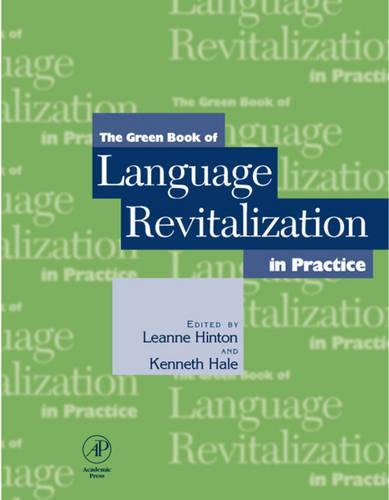Overview
With world-wide environmental destruction and globalization of economy, a few languages, especially English, are spreading rapidly in use, while thousands of other languages are disappearing, taking with them important cultural, philosophical and environmental knowledge systems and oral literatures. We all stand to suffer from such a loss, none more so than the communities whose very identity is being threatened by the impending death of their languages. In response to this crisis, indigenous communities around the world have begun to develop a myriad of projects to keep their languages alive. This volume is a set of detailed accounts about the kind of work that is going on now as people struggle for their linguistic survival. It also serves as a manual of effective practices in language revitalization.
Full Product Details
Author: Leanne Hinton ,
Kenneth Hale
Publisher: Brill
Imprint: Academic Press Inc
Dimensions:
Width: 21.60cm
, Height: 2.50cm
, Length: 27.90cm
Weight: 1.390kg
ISBN: 9780123493538
ISBN 10: 0123493536
Pages: 450
Publication Date: 18 June 2001
Audience:
Professional and scholarly
,
Professional & Vocational
Format: Hardback
Publisher's Status: Active
Availability: Awaiting stock

The supplier is currently out of stock of this item. It will be ordered for you and placed on backorder. Once it does come back in stock, we will ship it out for you.
Reviews
This book focuses on most of the issues which are of serious academic interest in the practice of language revitalisation. It differs from some other books in this area, which focus more on the causes of language endangerment and marginalization. Modern mono-culture's threats to diversity (whether human or biological) form a topic of some interest in the media at the moment. Therefore, this book will appeal not only to language educators and linguists, but also to environmentalists, anthropologists and sociologists. Nicholas Ostler, President, Foundation for Endangered Languages, Bath UK This is a useful, and at times refreshing, collection. Among the high points are Hales's astute commentaries on immersion programs and the use of mass media to preserve (rather than overwhelm) local languages; Clay Slate's exploration of the tensions between indigenous and non-indigenous audiences in creating an intellectual forum for Navajo linguistic scholarship at the highest level; and the back-to-back chapters by Sam Warner and Bill Wilson on Hawaiian revitalization, an object-lesson in how feuding over control can subvert even the most successful of language programs. The concluding section on 'sleeping language' (languages with no surviving first-language speakers) is a timely exploration of the links between archival research-clearly the future of our field-and revitalization. The Society for the Study of the Indigenous Languages of the Americas Newsletter ...On the whole, this is a wonderful book, a welcome addition to the growing literature on endangered languages, and a repository of excellent language-renewal ideas. Attractively printed in large format, with an appropriately bright green cover, the volume deserves a place on the shelf of anyone interested in language revitalization or minority language teaching, whether linguist, language teacher, or community activist. THE MODERN LANGUAGE JOURNAL
Author Information
Leanne Hinton is a professor of linguistics at the University of California, the director of the Survey of California and Other Indian Languages, and a consulting member of the Advocates for Indigenous California Language Survival. Kenneth Hale has taught linguistics in the Anthropology Departments at the University of Illinois and Arizona, and since 1967, he has been teaching and doing research in the Department of Linguistics and Philosophy at the Massachusetts Institute of Technology.




